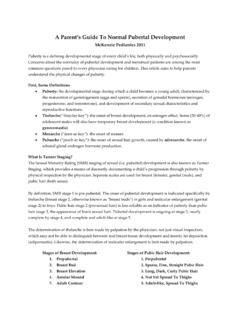Transcription of The Role of Neurotransmitters & Hormones in Sleep
1 The Role of Neurotransmitters & Hormones in SleepNew Hampshire Natural Health ClinicBradley Bush, NDRebecca Bush, NDBert Mathieson, to Answer Why should we be concerned about Neurotransmitters ? What are they? Are they critical to our health? What is their contribution to clinical conditions? What role do they play in Sleep ?What are Neurotransmitters ? Chemicals that serve as messengers between the brain and organs. Analogous to the body s internal telephone system. Must have adequate levels to be healthy!Why are they important? Without Neurotransmitters , your brain could not tell: Your heart to beat Your lungs to breath Your stomach to digestNeurotransmitters Affect the ENTIREH uman BeingMentally Focus Learning abilityPhysically Sleep Cardiac Function Metabolism/WeightEmotionally Mood Behavior Social attitudeNeurotransmitter Imbalances Scientific studies suggest the incidence of neurotransmitter imbalances in the population is very in the Patient Population N=20000010020030040050060001020304050607 08090 Age(ug/gCr)Where do Imbalances Come From?
2 High levels of stress Poor dietary habits Environmental toxins GeneticsWhere do Imbalances Come From? Stressful lifestyles cause the body to lose Neurotransmitters rapidly, which leads to very low levels over do Imbalances Come From? Poor dietary habits (fast-food, junk food, sugars, etc.) do not provide the body with the building blocks for Neurotransmitters , called amino do Imbalances Come From? Environmental toxins, such as industrial cleaners, air & water pollution, and solvents kill brain cells, which contain the Neurotransmitters . Brain cells CANNOT be replaced!Where do Imbalances Come From? Some people have poor neurotransmitter levels due to their Imbalances Result in: Insomnia Weight Problems Depression Fatigue Migraines ADD/ADHD/Autism Anxiety OCD Behavioral Issues OthersNeurotransmitters & Sleep Neurotransmitters control many aspects of Sleep .
3 Falling asleep Staying asleep Getting deep Sleep (REM) The waking processNeurotransmitters & Sleep Neurotransmitters are divided into two categories: Excitatory Energizing Motivating Provide focus Rev up the system Inhibitory Calming Relaxing Sleep inducing Slow down the systemNeurotransmitters & Sleep Elevated levels of excitatory Neurotransmitters can lead to Sleep disturbances. Excitatory Neurotransmitters related to Sleep : Epinephrine (adrenalin) Norepinephrine (noradrenalin) Phenylethylamine (PEA) Glutamate HistamineNeurotransmitters & Sleep Low levels of inhibitory Neurotransmitters can lead to Sleep disturbances. Inhibitory Neurotransmitters related to Sleep : Serotonin GABA Taurine GlycineNeurotransmitters & Sleep During the day, excitatory neurotransmitter levels are high, providing the energy and motivation necessary to carry out normal functions.
4 During the evening, excitatory levels drop and inhibitory transmitter levels rise, preparing the body for & Sleep Around bed time, the drop in excitatory neurotransmitter levels and rise in inhibitory levels signal the production of melatonin. During the night, low levels of excitatory transmitters and increased levels of inhibitory transmitters and melatonin are what the body needs for deep, restful & Sleep Melatonin is known as the Sleep hormone and is responsible for inducing Sleep in humans. Melatonin is made from serotonin in the body. Low levels of serotonin could lead to low levels of & Sleep Cortisol is known as the stress hormone and is produced by the adrenal gland. People experiencing high amounts of stress may have elevated cortisol levels. High night time cortisol levels can cause Sleep & <5 Optimal Range (nighttime)GABAPEAD opamineNorepinephrineEpinephrine3 AM Sample Insomnia Pt disturbances can be due to a number of different neurotransmitter & hormone & Sleep Trends associated with Sleep disturbances: Low serotonin levels Elevated levels of one or more excitatory Neurotransmitters Hormonal imbalances: Low melatonin High cortisolWhat can be done?
5 Identifying which chemical is out of balance is the first step. A non-invasive hormone & neurotransmitter test can identify if there is an imbalance in the system. Once the imbalance has been identified, a targeted therapeutic regimen can be can be done? Healthy lifestyle choices can improve neurotransmitter & hormone levels, leading to better Sleep patterns. Eat a healthy diet, avoiding foods high in sugars Exercise Avoid environmental toxins Develop a consistent Sleep scheduleBenefits of a Healthy Diet Neurotransmitters are made from protein-containing foods in our diet. Sugar can lead to depletion of certain Neurotransmitters . Avoiding large amounts of sugar helps prevent the rapid loss of Neurotransmitters that eventually leads to low of Exercise Exercise raises the levels of many Neurotransmitters , including serotonin. Exercise during the day has been scientifically shown to help people Sleep more soundly.
6 Case Study Chronic insomnia patient, unable to fall asleep on a nightly basis. Elevated PEA & epinephrine, and low serotonin are likely causes. <5 Optimal Range (nighttime)GABAPEAD opamineNorepinephrineEpinephrineFemale, 46 PM SampleCase Study Patient began Targeted Amino Acid Therapy program designed to raise serotonin and lower PEA & epinephrine. <5 Optimal Range (nighttime)GABAPEAD opamineNorepinephrineEpinephrineFemale, 46 PM SampleCase Study After 3 months of therapy, the neurotransmitter values have normalized and the patient was able to fall asleep regularly. <5 Optimal Range (nighttime)GABAPEAD opamineNorepinephrineEpinephrineFemale, 46 PM SampleSummary Sleep is a complex biological process that is influenced by many neuroendocrineparameters. A disruption in one or more of these parameters can lead to Sleep disturbances. Identifying which chemical is out of balance is the first step in addressing Sleep Supplying the body with the building blocks (amino acids) for making Neurotransmitters is a natural, effective alternative to addressing Sleep related Hampshire Natural Health ClinicCall for an appointment(603)







